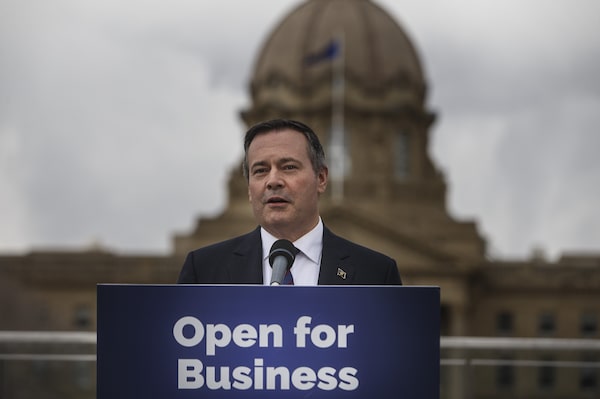
Premier-designate Jason Kenney addresses the media the day after his election victory in Edmonton on April 17, 2019.JASON FRANSON/The Canadian Press
Alberta premier-designate Jason Kenney says he’ll confront provincial barriers to pipelines immediately upon taking office later this month, targeting British Columbia with a threat to stop oil and gas shipments while taking a softer approach with Quebec that will focus instead on selling the merits of the province’s crude.
Mr. Kenney, who will be sworn in as premier on April 30 after his United Conservative Party’s commanding win in Tuesday’s election, said he spoke to the premiers of both provinces on Wednesday, as well as to Prime Minister Justin Trudeau. He said he’s looking to win friends for Alberta’s energy sector despite his combative approach to pipelines during the campaign.
“You don’t start a relationship by shouting at each other. You start it by talking and trying to find common ground,” he told reporters in front of the Alberta legislature in Edmonton.
“We will begin with the path of diplomacy and … we hope that we don’t need to use more forceful measures to assert Alberta’s vital economic interests.”
Nonetheless, the UCP Leader is taking a confrontational approach to dealing with B.C. and is using a more conciliatory strategy in relations with Quebec. He has long blamed both provinces for getting in the way of new pipelines.
Mr. Kenney said his cabinet’s first order of business after the swearing in will be to bring into force legislation passed, but never enacted, by the NDP government that would allow the province to cut off oil shipments to B.C. in retaliation for opposition to the Trans Mountain pipeline project. Several weeks later, when the legislature convenes in the third week of May, the government will introduce and pass legislation repealing the province’s carbon tax.
Both moves are expected to result in legal confrontations.
Ottawa sets mid-June deadline to decide on Trans Mountain pipeline expansion
Trans Mountain, Trudeau and First Nations: A guide to the political saga so far
Alberta election 2019: Jason Kenney has won. What happens now? A guide
In his victory speech Tuesday, Mr. Kenney appealed for Quebec to support Alberta’s oil industry and allow new pipelines in the province. Quebec Premier François Legault shot down the suggestion Wednesday morning: “There is no social acceptability for a new oil pipeline in Quebec.”
Mr. Kenney called the Quebec Premier’s choice of words unfortunate and said he would be looking to speak directly to the province and hopes to meet with Mr. Legault in person.
“The polls in Quebec show that Quebeckers prefer to buy and consume Canadian energy to foreign energy imports … . I think they would see no social acceptability for dictator oil that fuels conflict around the world,” Mr. Kenney said.
With the incoming Alberta government poised to punish British Columbia over its opposition to pipelines, Premier John Horgan says he aims to have a positive working relationship with Mr. Kenney. The premier-designate has said he could hit B.C. with “turn-off-the-taps” legislation that would drive up gas prices, as retaliation for the Horgan government’s position on the Trans Mountain expansion that would get Alberta oil to overseas markets.
“We had a positive conversation,” Mr. Horgan told reporters in Prince George. “We agreed that we will meet in the short term. … I’m confident we will continue to work in a positive way.”
B.C.’s attorney-general had launched a lawsuit against Alberta’s oil-blocking legislation, which was passed by Rachel Notley’s New Democrats. However, the lawsuit was dismissed because the legislation never came into force. The province has said it will dust off the lawsuit and seek an injunction if Mr. Kenney pushes ahead.
Mr. Kenney said he used his phone call with Mr. Trudeau to reiterate his concerns with environmental-assessment legislation, Bill C-69, that he argues would hurt the province’s oil industry. He said he and Mr. Trudeau agreed to set up a meeting soon, though he acknowledged the approaching federal election could complicate that.
“We had a respectful conversation about a number of issues, including the need to get Canadian energy to foreign markets,” Mr. Kenney said.
“I think Prime Minister Trudeau knows that if we can’t get coastal access for our energy, that this new government will vigorously stand up for Alberta.”
Federal Environment Minister Catherine McKenna said Ottawa will impose a carbon price in Alberta if Mr. Kenney drops the provincial tax. Ottawa will also look to cut emissions from industrial sources, including the oil sands.
“None of our policies have changed,” Ms. McKenna said. “There has been a change of government in Alberta, yes. But we know we need to be taking serious action on climate change, but we also need to get our resources to market.”
With reports from Justine Hunter and Shawn McCarthy